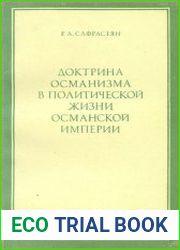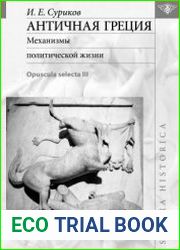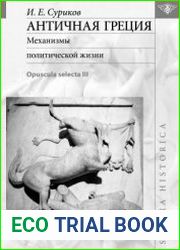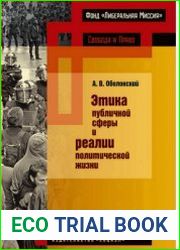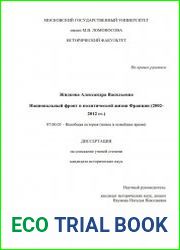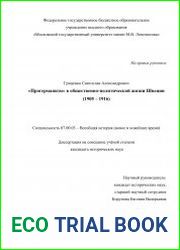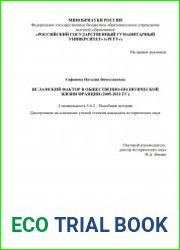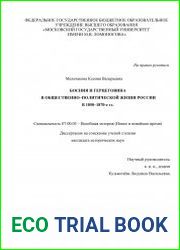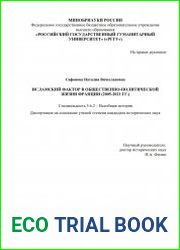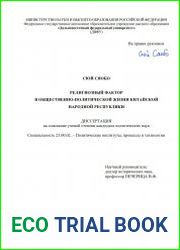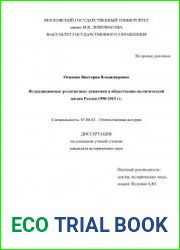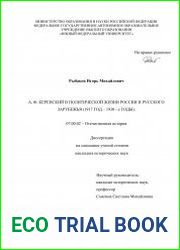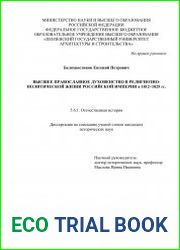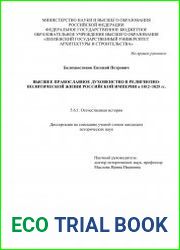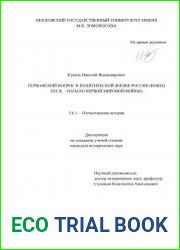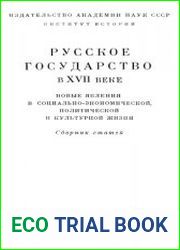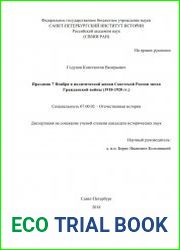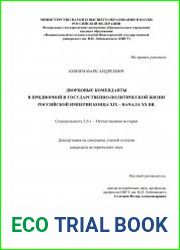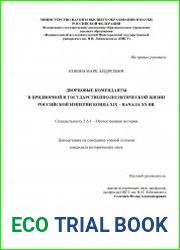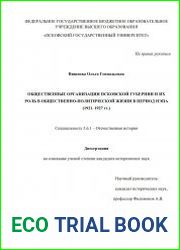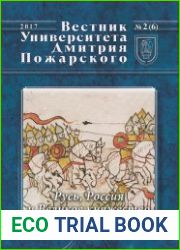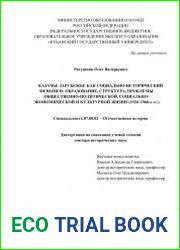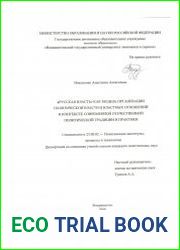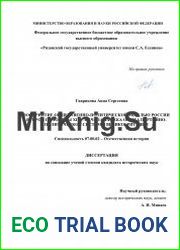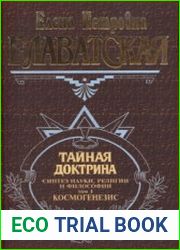
BOOKS - HISTORY - Доктрина османизма в политической жизни Османской империи...

Доктрина османизма в политической жизни Османской империи
Author: Сафрастян Р.
Year: 1985
Pages: 148
Format: PDF
File size: 10 MB
Language: RU

Year: 1985
Pages: 148
Format: PDF
File size: 10 MB
Language: RU

The monograph examines the range of problems associated with the genesis and peculiarities of the formation of the doctrine of Ottomanism, its influence on the political life of the Ottoman Empire, and specific methods of Osmanization of subjugated peoples. The author analyzes the historical context of the emergence of this ideology, its evolution, and the impact it had on the development of the state and society. The book also explores the role of Ottomanism in the consolidation of power, the creation of a single Islamic identity, and the preservation of the Ottoman Empire's territorial integrity. The author argues that the study of Ottomanism is essential to understanding the complex history of the Ottoman Empire and its legacy in modern times. The book begins by discussing the origins of Ottomanism and how it evolved over time, from its early beginnings as a tool for unifying diverse ethnic groups under the Ottoman banner to its later use as a means of suppressing dissent and maintaining control over conquered territories. The author highlights the key features of Ottomanism, including its emphasis on Islamic values, the importance of loyalty to the sultan, and the belief in the superiority of Turkish culture.
В монографии рассматривается круг проблем, связанных с генезисом и особенностями формирования учения об османизме, его влиянием на политическую жизнь Османской империи, конкретными методами османизации покорённых народов. Автор анализирует исторический контекст возникновения этой идеологии, ее эволюцию, влияние, которое она оказала на развитие государства и общества. Книга также исследует роль османизма в консолидации власти, создании единой исламской идентичности и сохранении территориальной целостности Османской империи. Автор утверждает, что изучение османизма имеет важное значение для понимания сложной истории Османской империи и её наследия в Новое время. Книга начинается с обсуждения истоков османизма и того, как он развивался с течением времени, от его ранних истоков в качестве инструмента для объединения различных этнических групп под османским знаменем до его последующего использования в качестве средства подавления инакомыслия и сохранения контроля над завоёванными территориями. Автор выделяет ключевые черты османизма, включая его акцент на исламских ценностях, важность лояльности султану и веру в превосходство турецкой культуры.
La monographie traite de l'ensemble des problèmes liés à la genèse et aux caractéristiques de la formation de l'enseignement de l'ottomanisme, de son impact sur la vie politique de l'Empire ottoman, des méthodes spécifiques d'ottomanisation des peuples soumis. L'auteur analyse le contexte historique de l'émergence de cette idéologie, son évolution, l'impact qu'elle a eu sur le développement de l'État et de la société. livre explore également le rôle de l'osmanisme dans la consolidation du pouvoir, la création d'une identité islamique unique et la préservation de l'intégrité territoriale de l'Empire ottoman. L'auteur affirme que l'étude de l'osmanisme est importante pour comprendre l'histoire complexe de l'Empire ottoman et son héritage au Nouveau Temps. livre commence par discuter des origines de l'Ottomanisme et de la façon dont il s'est développé au fil du temps, depuis ses origines initiales en tant qu'outil pour unir les différents groupes ethniques sous la bannière ottomane jusqu'à son utilisation ultérieure comme moyen de réprimer la dissidence et de maintenir le contrôle des territoires conquis. L'auteur met en évidence les caractéristiques clés de l'osmanisme, y compris son accent sur les valeurs islamiques, l'importance de la loyauté au sultan et la foi dans la supériorité de la culture turque.
La monografía aborda el abanico de problemas relacionados con la génesis y las peculiaridades de la formación de la doctrina del otomanismo, su influencia en la vida política del Imperio otomano, los métodos específicos de osmanización de los pueblos sometidos. La autora analiza el contexto histórico del surgimiento de esta ideología, su evolución, el impacto que tuvo en el desarrollo del Estado y de la sociedad. libro también explora el papel del otomanismo en la consolidación del poder, la creación de una identidad islámica unificada y la preservación de la integridad territorial del Imperio otomano. autor sostiene que el estudio del otomanismo es esencial para entender la compleja historia del Imperio otomano y su legado en los tiempos modernos. libro comienza discutiendo los orígenes del otomanismo y cómo se desarrolló a lo largo del tiempo, desde sus primeros orígenes como instrumento para unir a los distintos grupos étnicos bajo la bandera otomana hasta su posterior uso como medio para suprimir la disidencia y mantener el control de los territorios conquistados. autor destaca los rasgos clave del otomanismo, incluyendo su énfasis en los valores islámicos, la importancia de la lealtad al sultán y la creencia en la superioridad de la cultura turca.
A monografia aborda uma série de problemas relacionados com a genese e as características da formação de ensinamentos sobre o otomanismo, sua influência na vida política do Império Otomano, métodos específicos para a otomanização dos povos conquistados. O autor analisa o contexto histórico do surgimento desta ideologia, a sua evolução, a influência que ela teve no desenvolvimento do Estado e da sociedade. O livro também explora o papel do otomanismo na consolidação do poder, na criação de uma única identidade islâmica e na preservação da integridade territorial do Império Otomano. O autor afirma que estudar o otomanismo é importante para entender a história complexa do Império Otomano e seu legado no Novo Tempo. O livro começa por discutir as origens do otomanismo e como ele evoluiu ao longo do tempo, desde suas origens iniciais como ferramenta para unir os diferentes grupos étnicos sob a bandeira otomana até ser usado como forma de reprimir a dissidência e manter o controle sobre os territórios conquistados. O autor destaca as características essenciais do otomanismo, incluindo sua ênfase nos valores islâmicos, a importância da lealdade ao sultão e a crença na supremacia da cultura turca.
La monografia affronta una serie di problemi legati alla genesi e alle caratteristiche della formazione degli insegnamenti sull'ottomanismo, la sua influenza sulla vita politica dell'impero ottomano, i metodi specifici per osmanizzare le popolazioni sottomesse. L'autore analizza il contesto storico della nascita di questa ideologia, la sua evoluzione, l'impatto che ha avuto sullo sviluppo dello Stato e della società. Il libro esplora anche il ruolo dell'ottomanismo nel consolidamento del potere, nella creazione di un'unica identità islamica e nel mantenimento dell'integrità territoriale dell'impero ottomano. L'autore sostiene che lo studio dell'ottomanismo è essenziale per comprendere la complessa storia dell'impero ottomano e la sua eredità nel Nuovo Tempo. Il libro inizia discutendo le origini dell'ottomanismo e come si è evoluto nel corso del tempo, dalle sue origini iniziali come strumento per unire i vari gruppi etnici sotto la bandiera ottomana fino ad usarlo successivamente come strumento per sopprimere il dissenso e mantenere il controllo dei territori conquistati. L'autore sottolinea le caratteristiche chiave dell'ottomanismo, tra cui la sua enfasi sui valori islamici, l'importanza della lealtà al sultano e la fede nella supremazia della cultura turca.
Die Monographie untersucht das Spektrum der Probleme, die mit der Entstehung und den Besonderheiten der Bildung der hre vom Osmanismus, seinem Einfluss auf das politische ben des Osmanischen Reiches und den konkreten Methoden der Osmanisierung der unterworfenen Völker verbunden sind. Der Autor analysiert den historischen Kontext der Entstehung dieser Ideologie, ihre Entwicklung, den Einfluss, den sie auf die Entwicklung von Staat und Gesellschaft hatte. Das Buch untersucht auch die Rolle des Osmanismus bei der Konsolidierung der Macht, der Schaffung einer einheitlichen islamischen Identität und der Erhaltung der territorialen Integrität des Osmanischen Reiches. Der Autor argumentiert, dass das Studium des Osmanismus für das Verständnis der komplexen Geschichte des Osmanischen Reiches und seines Erbes in der Neuzeit unerlässlich ist. Das Buch beginnt mit einer Diskussion über die Ursprünge des Osmanismus und wie er sich im Laufe der Zeit entwickelt hat, von seinen frühen Anfängen als Instrument zur Vereinigung verschiedener ethnischer Gruppen unter dem osmanischen Banner bis zu seiner späteren Verwendung als Mittel zur Unterdrückung von Dissens und zur Aufrechterhaltung der Kontrolle über die eroberten Gebiete. Der Autor hebt die wichtigsten Merkmale des Osmanismus hervor, einschließlich seiner Betonung islamischer Werte, der Bedeutung der Loyalität gegenüber dem Sultan und des Glaubens an die Überlegenheit der türkischen Kultur.
''
Monografi, Osmanlılık doktrininin oluşumunun doğuşu ve özellikleri, Osmanlı İmparatorluğu'nun siyasi yaşamı üzerindeki etkisi ve fethedilen halkları Osmanlılaştırmanın belirli yöntemleri ile ilgili sorunların çeşitliliğini inceler. Yazar, bu ideolojinin ortaya çıkışının tarihsel bağlamını, evrimini, devletin ve toplumun gelişimi üzerindeki etkisini analiz eder. Kitap aynı zamanda Osmanlıcılığın gücü pekiştirme, birleşik bir İslami kimlik oluşturma ve Osmanlı İmparatorluğu'nun toprak bütünlüğünü korumadaki rolünü de araştırıyor. Yazar, Osmanlıcılık çalışmasının Osmanlı İmparatorluğu'nun karmaşık tarihini ve modern zamanlardaki mirasını anlamak için önemli olduğunu savunuyor. Kitap, Osmanlıcılığın kökenlerinin ve zaman içinde nasıl geliştiğinin, çeşitli etnik grupları Osmanlı bayrağı altında birleştirmek için bir araç olarak ilk kökenlerinden, muhalifleri bastırmak ve fethedilen topraklar üzerindeki kontrolü sürdürmek için bir araç olarak kullanılmasına kadar bir tartışmayla başlıyor. Yazar, İslami değerlere vurgu, Sultan'a sadakatin önemi ve Türk kültürünün üstünlüğüne olan inanç da dahil olmak üzere Osmanlılığın temel özelliklerini vurgulamaktadır.
تبحث الدراسة مجموعة من المشاكل المرتبطة بنشأة وخصوصيات تكوين عقيدة العثمانية، وتأثيرها على الحياة السياسية للإمبراطورية العثمانية، والأساليب المحددة لعثمانية الشعوب الغازية. يحلل المؤلف السياق التاريخي لظهور هذه الأيديولوجية وتطورها وتأثيرها على تطور الدولة والمجتمع. يستكشف الكتاب أيضًا دور العثمانية في توطيد السلطة، وخلق هوية إسلامية موحدة، والحفاظ على السلامة الإقليمية للإمبراطورية العثمانية. يجادل المؤلف بأن دراسة العثمانية مهمة لفهم التاريخ المعقد للإمبراطورية العثمانية وتراثها في العصر الحديث. يبدأ الكتاب بمناقشة أصول العثمانية وكيف تطورت بمرور الوقت، من أصولها المبكرة كأداة لتوحيد مختلف الجماعات العرقية تحت الراية العثمانية إلى استخدامها لاحقًا كوسيلة لقمع المعارضة والحفاظ على السيطرة على الأراضي التي تم احتلالها. يسلط المؤلف الضوء على السمات الرئيسية للعثمانية، بما في ذلك تركيزها على القيم الإسلامية، وأهمية الولاء للسلطان، والإيمان بسيادة الثقافة التركية.







